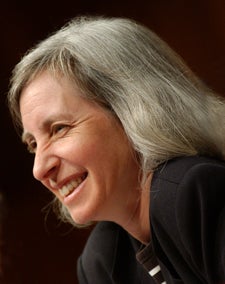In a recent interview for the Spindle Law Blog, Harvard Law School Dean Martha Minow discussed her experience teaching, her work with the Legal Services Corporation, and the future of legal education.
In August 2009, President Barack Obama ’91 nominated Minow to the board of the Legal Services Corporation, a bi-partisan, government-sponsored organization that provides civil legal assistance to low-income Americans. The U.S. Senate confirmed her appointment on March 19, 2010 and she now serves as vice-chair. In April 2011, she was named co-chair of LSC’s Pro Bono Task Force, which was launched to help low-income Americans facing foreclosure, domestic violence and other serious civil legal problems.
An expert in human rights and advocacy for members of racial and religious minorities and for women, children, and persons with disabilities, Minow has authored many scholarly articles published in journals of law, history, and philosophy, as well as over a dozen books. Her most recent book is “In Brown’s Wake: Legacies of America’s Educational Landmark” (Oxford University Press 2010).
Spindle Law: Who were your professional mentors and how did they influence your career?
Martha Minow: My father is a distinguished lawyer and a former government official who influenced me with his service. My mother, who is not a lawyer, also has always given me professional advice and support. During college, I wanted to be anything but a lawyer. But I was in graduate school, in education, at Harvard, in 1975, which was at the beginning of public school desegregation and court-ordered busing in Boston. I wanted to help children. I saw from that and other controversies that to make the kind of difference I wanted, I needed a law degree. So I went to law school.
SL: You have been teaching at Harvard since the early 1980s. How has the experience changed for you over time?
MM: Well, it took some time, but I think I’ve learned how to teach. I have branched out to many other subject areas. I began teaching family law, children’s issues, civil procedure. Over time, I’ve taught classes in constitutional law, non-profit organizations, international criminal justice, law and science, privacy, jurisprudence, and ethics. This spring, I will co-teach a new course, “The Digital Self.”
SL: What do you predict the next big changes for legal education to be in the coming decade?
MM: This is a fascinating time for law schools, lawyers, and those hoping for more access to justice. Practice is becoming more global, more interdisciplinary, focused on teamwork. The great opportunity and challenge for law professors is to assist in preparing the new generation of students for changes that we cannot fully predict and for becoming the kinds of problem-solvers adept at tackling unprecedented issues. On the legal scholarship side, more law professors are pursuing work that resembles arts and sciences scholarship. The insights from interdisciplinary work can be fascinating and valuable; the challenge for law professors is to bridge theory and practice, and find ways to speak effectively to both scholars and to practitioners.
